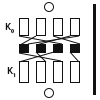CYBV440 Digital Espionage
Course Description
CYBV440 will provide students with a comprehensive overview of the concepts, tactics, techniques adversaries use to steal secrets for political or economic reasons. Students will analyze case studies to become familiar with how to detect, identify, and mitigate digital espionage operations and the actors who conduct them.
Learning Outcomes
Upon completion of this course students will be able to:
- Define cyber espionage articulating how it defers from cyber warfare.
- Demonstrate a clear understanding of the relationship of the U.S. Constitution to government-sanctioned cyber espionage activities.
- Outline in-depth relevant laws and statutory authorities allowing for cyber intelligence operations.
- Clearly articulate the missions and functions of U.S. Intelligence agencies authorized to conduct cyber espionage on behalf of the U.S. Government.
- Examine and predict the tactics and techniques adversaries use to steal secrets for political or diplomatic advantage.
- Analyze and evaluate case studies by identifying how to detect and mitigate digital espionage operations.
Course Objectives
During this course students will:
- Describe and evaluate cyber espionage.
- Articulate when espionage crosses into the territory of war.
- Define rationale for nation-states conducting cyber espionage.
- Articulate the key advantages which can be achieved through non-consensual information gathering.
- International law, norms and policies attempting to regulate online espionage activities.
- Rules of territorial sovereignty, non-intervention and non-use of force in virtual spaces that are not geographically bound.
- Historical examples of cyber espionage, techniques employed, and impact achieved.
- Clear understanding of common techniques for online intelligence gathering through cyber operations.
- The intelligence gathering cycle as it applies to cyber espionage.



 Cyberapolis
Cyberapolis Curriculum
Curriculum Career
Career Faculty
Faculty